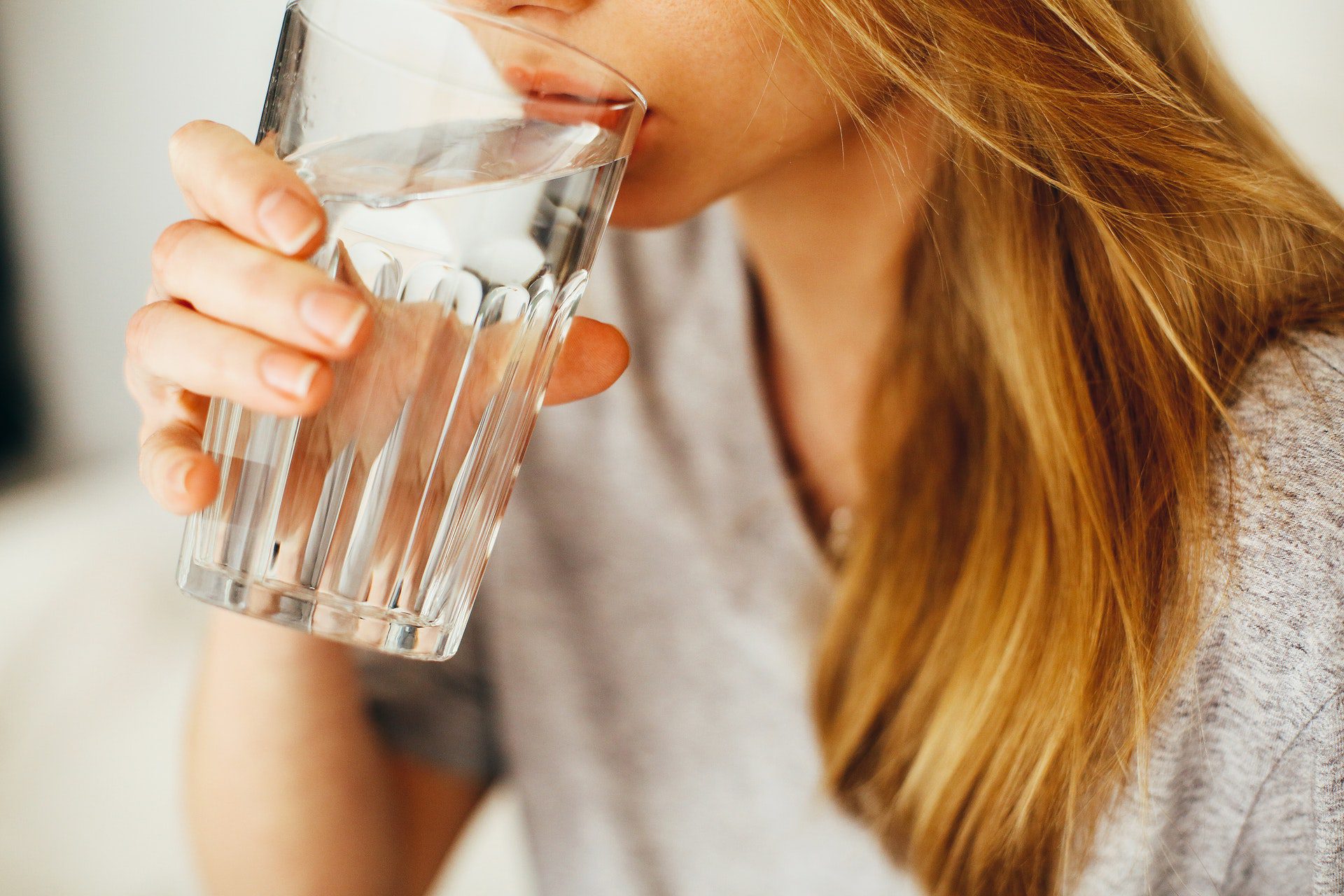
The best online fitness resource you'll ever need. We filter out the BS to ensure you meet your health and fitness goals!

The best online fitness resource you'll ever need. We filter out the BS to ensure you meet your health and fitness goals!

“How much water should I drink on keto?”, you ask yourself.
Well, in order to answer that question, we need to understand our bodies’ relationship with water. We can’t live without water. It helps us to digest our food, to generate energy, to keep cool, to maintain even blood pressure; it is present and vital in all of our cells, organs and tissue. We lose water as we breathe, sweat and digest, so it’s important to keep taking in dietary water by drinking plenty of fluids and eating foods that contain lots of water, like most fruits and vegetables.
The amount of water you will need depends on a few things. Your own biometrics play a part- your height, mass, muscularity and so forth. So do your activity levels, the climate in which you live, and any underlying health conditions you may face.
However, if you are following a ketogenic diet, water demands can be altered quite considerably.
Water, and adequate hydration, is important. It helps your body to perform many of its most vital tasks, including:
Water also enables hydrolysis, a crucial part of the digestive process. Through hydrolysis, food is softened in the stomach, paving the way for digestive acid in the stomach to fully break it down.
Aside from asking why water is important for the body, we also need to appreciate that, to a very large degree, the human body is water. 60% of your body weight is made up of water. Maintaining this ratio is important at the most fundamental way imaginable.

We lose water every day. It is removed from our bodies in the form of sweat, urine, stool and exhaled water vapour. Alongside the water itself, we also lose small yet significant amounts of salts or electrolytes. Your body will be constantly adjusting the balance of these losses with fluid intake, signalling to you to drink more when more fluid is needed.
When we don’t drink enough water to replace what we need and use, we become dehydrated. This is when more water is being taken out of individual cells and the body overall than is being taken in, and actually occurs a lot sooner than the parched feeling in our mouths often associated with being parched or experiencing thirst.
Dehydration can leave you feeling tired and weak as your body operates sub-optimally. It can turn into a serious health risk if left unaddressed. Dehydration usually means that you have lost or used enough fluid, without replacing it, that your body begins to function sub-optimally at first. Dehydration is commonly split into three stages:
Mild and often even moderate dehydration are common enough occurrences that can easily be reversed. Balance can be quickly achieved again by oral intake of fluids that contain electrolytes (or salts) that have been lost. As and when you experience thirst or any related symptoms, this will be mild to perhaps moderate dehydration taking place, and it is important to remedy it quickly.
This is followed at stage 3) by more serious symptoms of dehydration as organ failure occurs and nausea and disorientation take place. If severe dehydration occurs, medical treatment may be needed in order to avoid serious complications. In severe cases, dehydration can result in death.
However, if you follow a ketogenic dietary protocol, you need to be particularly wary about dehydration: you really need to keep an eye on your water consumption and the vital signs of hydration in your body. This is because the ketogenic diet changes how your body deals with water with regards energy storage.

It’s a good idea to correctly work out and monitor you water requirements when you’re on a ketogenic diet, at least when you’re first starting out.
This is because of the change that ketosis brings to the body’s cellular mechanisms. Of course, keto functions due to the body’s change from metabolising carbohydrates to using stored bodyfat as its main energy source. However, this brings about some unintended consequences with regards water usage. As the body turns carbs into energy, water plays an important role in storing the resulting glycogen. Several grams of water will be stored in the body for every gram of glycogen- this is why it’s quite common to feel bloated, or to carry extra ‘water weight’, when you’ve had a carb heavy meal like pasta or pizza.
The loss of this water weight will represent some of a keto dieter’s initial weight loss. As soon as you cut down on carb intake, the water stored in your body will deplete. As carbs become scarcer in your everyday diet, your body will turn to the carbs it already has in storage and will burn them for fuel. The water stored along with the glycogen is released at the same time. As your body can hold up to a pound of glycogen at any one time, this can mean several pounds of water loss as it is shifted.
When you limit your carbs as much as you will do on a ketogenic diet, drinking water becomes crucial. Because your body will no longer be storing water as it would in the presence of large amounts of glycogen, it will begin to run a water deficit.
It is therefore quite common for people to suddenly start becoming thirsty more often in the initial stages of ketosis, as the body signals that more water is needed. Dehydration is often lumped together with other causes of the ‘keto flu’- the flu like symptoms that often present themselves in the first few weeks of entering a ketogenic diet, before true ketosis begins. Keto flu symptoms include feelings of fatigue, a lack of strength and/or energy, and nausea: all similar symptoms to dehydration.
It is crucial, therefore, not to shrug off these symptoms as merely a standard keto flu. Take them seriously, because there is a good chance that they are due to hydration. Drink plenty, and drink often, to avoid some potentially critical side effects.

As with most things surrounding your diet, the amount of water you need is fairly personal. It varies, as mentioned above, according to your own biometrics, your activity levels, the climate in which you live… it can even vary day-by-day.
Rather than asking how many litres or cups of water you should drink per day, it may be more helpful to run your water intake by two maxims.
The first is simple: you should drink as much water as is practical. You will only pass what you don’t need in the form of urine, so take in as much as you can, as often as possible.
The second is quite simple, too: your body will let you know how much water it needs. Or rather, it will let you know when you’re having enough, and when you need more. It will tell you when it is thirsty, indicating that you need to drink. It will let you know when it is dehydrated, and it will let you know when it is adequately hydrated. One of the easiest things to look out for is the colouration of your urine. If it is dark, you’re dehydrated: the clearer it is (and often the less odorous) the more adequately hydrated you are.
Common signs and symptoms of dehydration range from minor to severe, as we saw above. Good indicators for mild to moderate dehydration include the following:
These symptoms may quickly worsen and indicate severe dehydration with signs and symptoms developing. Good indicators for severe dehydration include:
If you experience any of the above symptoms, you are dehydrated. Avoid them by drinking plenty and seek immediate medical help if they do present themselves.
Knowing your hydration levels can seem a little daunting, but if you follow the above, simple rules- and watch out for the symptoms we have gone through- you should be OK. However, the process does become a little bit trickier when you’re following a ketogenic diet.
There are some top tips, however, for keeping on top of your hydration without it becoming laborious and untenable. These include:

As low carb diets deplete you of water, so too are electrolyte levels depleted. This can be as crucial as the water itself, as electrolytes are important for many of your body’s essential processes.
The word ‘electrolyte’ is a catch-all term for a series of particles that carry a positive or negative electric charge. Nutritionally, this generally refers to the essential minerals found in your blood, sweat and urine: these minerals form electrolytes when dissolved, and are used in various metabolic and bodily processes.
They play a role in conducting nervous impulses and maintaining healthy nervous system function, contracting muscles, keeping you hydrated by maintaining cellular fluid balance and controlling osmosis, and regulating your body’s pH levels. Lacking them will impede all of these processes, aggravating feelings of fatigue and nausea. Therefore, it’s very important that you get adequate numbers and quantities of electrolytes from your diet.
Electrolytes found in your body include:
Severe electrolyte imbalances can cause symptoms including:
If you experience any of these symptoms, speak to a qualified healthcare provider as a matter of urgency. If you’re following a ketogenic diet, good sources of electrolytes to prevent deficiency include:
Sodium, from sources such as:
Potassium, from sources such as:
Magnesium, from sources such as:
If in doubt, supplementation for key minerals is likely a good idea. If you find yourself flagging during intense exercise, it may also be worth looking into isotonic or electrolyte-enhanced sports drinks (though, of course, beware of drinks with high sugar content.)
We have by no means exhausted the topic of hydration today- in fact, we’ve barely scratched the surface. It’s an incredibly complex subject, with a great many variables, and a great many potential complications and ramifications. However, the average dieter needn’t concern themselves overly with these minutiae. The main things that need to be taken into account are what we have covered today.
If you are entering a ketogenic diet, or if you’ve been on one for a while but suspect that you are suffering from dehydration, then it’s imperative that you keep on top of your water intake. Schedule regular drinks, taking in small amounts, frequently.
Keep an eye on how your body is feeling, alongside your mood and energy levels. Keep an eye on your digestive system and your urine and stool output- though it may not be the most pleasant task in the world. If nothing else tells you the state of your hydration, these will. Hard stools that are difficult to pass may be a sign of dehydration. Infrequent bathroom trips with dark, pungent urine is definitely a sign of dehydration. Any of the physical factors discussed above should act as warning signs, telling you to drink more, and more often.
Finally, pack your diet with foods that gear themselves towards proper water and electrolyte intake. Fluid rich vegetables should form the mainstay of your limited carbohydrate intake, and mineral rich ingredients will finish the job, keeping you in good health with plenty of electrolytes. If in doubt, use electrolyte supplements, and if you do experience any symptoms of dehydration- especially long-term and more severe symptoms- seek medical help.